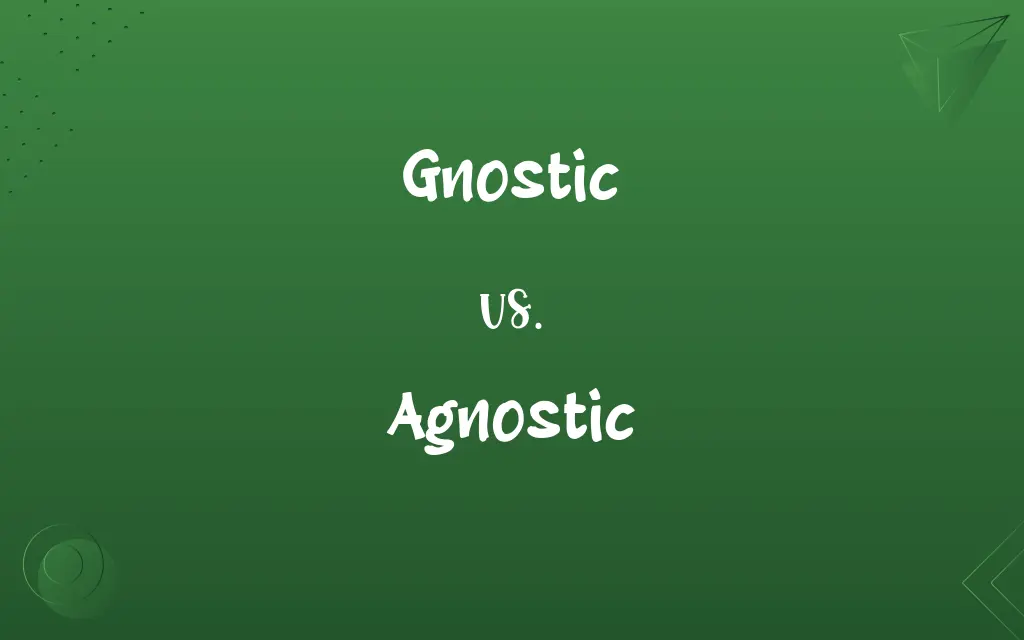Gnostic vs. Agnostic: Know the Difference

By Shumaila Saeed || Published on January 15, 2024
Gnostic refers to having knowledge or belief in something, while Agnostic refers to a lack of certainty or belief, often regarding the existence of a higher power or the nature of reality.

Key Differences
Gnostic refers to a belief system that emphasizes mystical knowledge as a path to enlightenment, often involving esoteric insights into the divine or spiritual realm. Agnostic, in contrast, signifies a position of uncertainty or skepticism about the existence of gods or a higher power, without outright denial.
Shumaila Saeed
Jan 15, 2024
Gnostic teachings often involve complex cosmologies and a distinction between higher spiritual truth and lower material reality. Agnostics, however, typically refrain from making definitive claims about spiritual realities, focusing instead on the limits of human knowledge and understanding.
Shumaila Saeed
Jan 15, 2024
In Gnosticism, salvation or enlightenment is achieved through personal spiritual knowledge (gnosis). Conversely, being agnostic implies a stance of open-mindedness or indecision regarding the existence or knowledge of a supreme being or the divine.
Shumaila Saeed
Jan 15, 2024
Gnostic thought can encompass a variety of religious and philosophical systems, all stressing the importance of inner spiritual knowledge. Agnosticism, meanwhile, can be a position adopted by people across various religious and philosophical spectrums, reflecting a philosophical approach to the unknowable or unproven.
Shumaila Saeed
Jan 15, 2024
Gnosticism historically has been associated with early Christian sects and other religious movements, emphasizing direct personal experience of the divine. Agnosticism, as a term coined in the 19th century, primarily relates to the modern discourse on faith, science, and the existence of God, without asserting the presence or absence of the divine.
Shumaila Saeed
Jan 15, 2024
ADVERTISEMENT
Comparison Chart
Definition
Emphasizes spiritual knowledge and enlightenment.
Expresses uncertainty or skepticism about the existence of God.
Shumaila Saeed
Jan 15, 2024
Belief System
Often linked with esoteric and mystical traditions.
Does not adhere to a specific belief system; focuses on doubt or non-commitment.
Shumaila Saeed
Jan 15, 2024
Historical Context
Associated with early religious movements, especially in Christianity.
Emerged in the 19th century, influenced by scientific and philosophical inquiry.
Shumaila Saeed
Jan 15, 2024
Approach to Divinity
Seeks direct, personal experience or knowledge of the divine.
Maintains a position of uncertainty or non-commitment regarding divine existence.
Shumaila Saeed
Jan 15, 2024
Philosophical Implications
Implies a deeper understanding of spiritual or mystical realms.
Indicates a skeptical or questioning approach to existential and theological claims.
Shumaila Saeed
Jan 15, 2024
ADVERTISEMENT
Gnostic and Agnostic Definitions
Gnostic
Connected with early Christian sects emphasizing personal spiritual revelation.
Gnostic teachings often contrast with orthodox Christian doctrines.
Shumaila Saeed
Dec 19, 2023
Agnostic
Uncertain or non-committal about the existence of God.
He considered himself agnostic, questioning the nature of divine existence.
Shumaila Saeed
Dec 19, 2023
Gnostic
Referring to the belief in direct, personal knowledge of the divine.
Gnostic practices involve seeking a direct connection with the spiritual realm.
Shumaila Saeed
Dec 19, 2023
Agnostic
Holding a view that the existence of a deity is unknown or unknowable.
As an agnostic, she preferred to keep an open mind about spirituality.
Shumaila Saeed
Dec 19, 2023
Gnostic
Describing a philosophical or religious belief in hidden spiritual truths.
The philosopher's gnostic approach to spirituality intrigued many.
Shumaila Saeed
Dec 19, 2023
ADVERTISEMENT
Agnostic
Not subscribing to any specific religious doctrine or belief.
Her agnostic views led her to explore various philosophies.
Shumaila Saeed
Dec 19, 2023
Gnostic
Relating to knowledge that is mystical and secretive.
Her gnostic beliefs led her to study ancient religious manuscripts.
Shumaila Saeed
Dec 19, 2023
Agnostic
Doubtful or hesitant to commit to any spiritual belief.
His agnostic perspective was shaped by years of philosophical inquiry.
Shumaila Saeed
Dec 19, 2023
Gnostic
Gnostic Of, relating to, or possessing intellectual or spiritual knowledge.
Shumaila Saeed
Dec 13, 2023
Agnostic
One who believes that it is impossible to know whether there is a God.
Shumaila Saeed
Dec 13, 2023
Agnostic
One who is skeptical about the existence of God but does not profess true atheism.
Shumaila Saeed
Dec 13, 2023
Agnostic
Doubtful or noncommittal
"Though I am agnostic on what terms to use, I have no doubt that human infants come with an enormous 'acquisitiveness' for discovering patterns" (William H. Calvin).
Shumaila Saeed
Dec 13, 2023
Agnostic
(Computers) Operable or functioning using any operating system or other digital technology. Often used in combination
Software that is platform agnostic.
Shumaila Saeed
Dec 13, 2023
Agnostic
Of or relating to agnosticism or its adherents.
His agnostic viewpoint is summarized in his book.
Shumaila Saeed
Dec 13, 2023
Gnostic
Of or pertaining to Gnosticism or its adherents; as, the Gnostic heresy.
Shumaila Saeed
Dec 13, 2023
Agnostic
Doubtful or uncertain about the existence or demonstrability of God or other deity.
She left the church when she had become agnostic.
Shumaila Saeed
Dec 13, 2023
Gnostic
One of the so-called philosophers in the first ages of Christianity, who claimed a true philosophical interpretation of the Christian religion. Their system combined Oriental theology and Greek philosophy with the doctrines of Christianity. They held that all natures, intelligible, intellectual, and material, are derived from the Deity by successive emanations, which they called Eons.
Shumaila Saeed
Dec 13, 2023
Agnostic
Having no firmly held opinions on something.
I'm agnostic on whether ethanol is a green fuel.
He says he's agnostic concerning the Secretary's claims.
Shumaila Saeed
Dec 13, 2023
Agnostic
Unaware or noncommittal regarding the specific nature of the components or input with which it interacts.
The socket communications layer is agnostic with regard to its underlying transport mechanism—it is “transport-agnostic”.
The software's registration key is platform agnostic and will work on both x86 and ARM processors.
Shumaila Saeed
Dec 13, 2023
Agnostic
A person who holds to a form of agnosticism, especially uncertainty of the existence of a deity.
Shumaila Saeed
Dec 13, 2023
Agnostic
Professing ignorance; involving no dogmatic; pertaining to or involving agnosticism.
Shumaila Saeed
Dec 13, 2023
Gnostic
Pertaining to esoteric spiritual knowledge.
The ancient gnostic texts reveal hidden insights about the universe.
Shumaila Saeed
Dec 19, 2023
Agnostic
One who professes ignorance, or denies that we have any knowledge, save of phenomena; one who supports agnosticism, neither affirming nor denying the existence of a personal Deity, a future life, etc.
Shumaila Saeed
Dec 13, 2023
Agnostic
Skeptical about claims of spiritual or religious truth.
The scientist's agnostic stance made him question religious dogmas.
Shumaila Saeed
Dec 19, 2023
Repeatedly Asked Queries
Is Gnosticism a religion?
Gnosticism is more a set of spiritual beliefs and practices than an organized religion.
Shumaila Saeed
Jan 15, 2024
What is Gnosticism?
Gnosticism is a belief system emphasizing mystical and esoteric knowledge as a path to spiritual enlightenment.
Shumaila Saeed
Jan 15, 2024
What does Agnostic mean?
Agnostic refers to a person who is uncertain or non-committal about the existence of God or a higher power.
Shumaila Saeed
Jan 15, 2024
Can an Agnostic be spiritual?
Yes, agnostics can be spiritual, exploring spirituality without committing to specific religious beliefs.
Shumaila Saeed
Jan 15, 2024
Do Agnostics believe in God?
Agnostics typically do not commit to belief or disbelief in God; they remain uncertain or open-minded.
Shumaila Saeed
Jan 15, 2024
Is Gnosticism part of Christianity?
Some Gnostic beliefs intersect with Christianity, but Gnosticism is distinct and often considered heretical by mainstream Christianity.
Shumaila Saeed
Jan 15, 2024
How do Agnostics view religious texts?
Agnostics often view religious texts critically, questioning their literal truth and divine origin.
Shumaila Saeed
Jan 15, 2024
Can someone be both Gnostic and Agnostic?
It is rare, as Gnosticism involves a certain belief in spiritual knowledge, while agnosticism involves skepticism or uncertainty.
Shumaila Saeed
Jan 15, 2024
What are the main teachings of Gnosticism?
Gnosticism teaches that spiritual enlightenment comes from personal, inner knowledge of the divine.
Shumaila Saeed
Jan 15, 2024
What role does mysticism play in Gnosticism?
Mysticism is central to Gnosticism, emphasizing personal, direct experiences of the divine.
Shumaila Saeed
Jan 15, 2024
What distinguishes Gnostic beliefs from orthodox religious views?
Gnostic beliefs often emphasize personal spiritual experience over established doctrine or dogma.
Shumaila Saeed
Jan 15, 2024
How does agnosticism relate to atheism?
Agnosticism is about uncertainty regarding God's existence, whereas atheism is a disbelief in God.
Shumaila Saeed
Jan 15, 2024
Is agnosticism a form of skepticism?
Agnosticism can be seen as a form of skepticism, especially regarding knowledge of the divine.
Shumaila Saeed
Jan 15, 2024
How does Gnosticism view the material world?
Gnosticism often views the material world as lesser or illusory compared to the spiritual realm.
Shumaila Saeed
Jan 15, 2024
Can someone raised in a religious household be Agnostic?
Yes, individuals from religious backgrounds can adopt agnostic views through personal questioning and exploration.
Shumaila Saeed
Jan 15, 2024
How old is the Gnostic tradition?
Gnostic ideas have roots in early Christian and pre-Christian religious and philosophical thoughts.
Shumaila Saeed
Jan 15, 2024
Do Agnostics participate in religious rituals?
Some agnostics may participate in religious rituals culturally or as a form of community involvement.
Shumaila Saeed
Jan 15, 2024
Do Gnostics believe in a higher power?
Gnostics typically believe in a divine realm or higher spiritual truths, accessible through personal knowledge.
Shumaila Saeed
Jan 15, 2024
Can Agnostics pray?
Agnostics may pray, often as a form of personal reflection or meditation, rather than traditional religious prayer.
Shumaila Saeed
Jan 15, 2024
What is the ultimate goal of Gnosticism?
The ultimate goal of Gnosticism is achieving spiritual enlightenment through personal knowledge of the divine.
Shumaila Saeed
Jan 15, 2024
Share this page
Link for your blog / website
HTML
Link to share via messenger
About Author
Written by
Shumaila SaeedShumaila Saeed, an expert content creator with 6 years of experience, specializes in distilling complex topics into easily digestible comparisons, shining a light on the nuances that both inform and educate readers with clarity and accuracy.








































































